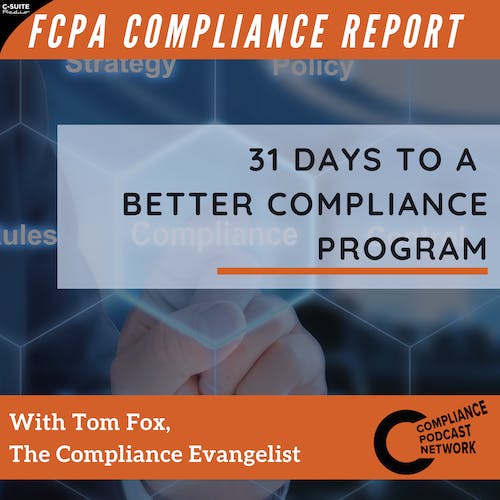Listen "One Month to a More Effective Compliance Program with Boards - Boards Inquiring Up and Down"
Episode Synopsis
Where does “tone at the top” start? It is with public and most private U.S. companies at the Board of Directors. But what is the role of a company’s Board in compliance? First, a Board should not engage in management but oversee a CEO and senior management. The Board asks hard questions, risk assessment, and identification.
These factors can be easily adapted to compliance and ethics risk management oversight. Initially, it must be necessary that the Board receive direct access to such information on a company’s policies on this issue. The Board must have quarterly or semi-annual reports from a company’s CCO to either the Audit Committee or the Compliance Committee. Every Board should create a Compliance Committee to deal with compliance issues, as an Audit Committee may more appropriately deal with financial audit issues. A Board Compliance Committee can devote itself exclusively to non-financial compliance. The Board’s oversight role should be to receive regular reports on the company’s compliance program’s structure, actions, and self-evaluations. From this information, the Board can oversee any modifications to managing FCPA risk that should be implemented.
Three key takeaways:
A Board Compliance Committee should provide oversight, not management.
A CCO should use multiple reports to communicate with the Board Compliance Committee.
Board Compliance Committee oversight makes companies more efficient and profitable.
Learn more about your ad choices. Visit megaphone.fm/adchoices
These factors can be easily adapted to compliance and ethics risk management oversight. Initially, it must be necessary that the Board receive direct access to such information on a company’s policies on this issue. The Board must have quarterly or semi-annual reports from a company’s CCO to either the Audit Committee or the Compliance Committee. Every Board should create a Compliance Committee to deal with compliance issues, as an Audit Committee may more appropriately deal with financial audit issues. A Board Compliance Committee can devote itself exclusively to non-financial compliance. The Board’s oversight role should be to receive regular reports on the company’s compliance program’s structure, actions, and self-evaluations. From this information, the Board can oversee any modifications to managing FCPA risk that should be implemented.
Three key takeaways:
A Board Compliance Committee should provide oversight, not management.
A CCO should use multiple reports to communicate with the Board Compliance Committee.
Board Compliance Committee oversight makes companies more efficient and profitable.
Learn more about your ad choices. Visit megaphone.fm/adchoices
More episodes of the podcast 31 Days to a More Effective Compliance Program
Day 28 - The Importance of Data Governance
28/01/2025
Day 26 - CCO Authority and Independence
26/01/2025
Day 24 - Internal Reporting and Triage
24/01/2025
Day 23 - Investigative Protocols
23/01/2025
Day 22 - Levels of Due Diligence
22/01/2025
 ZARZA We are Zarza, the prestigious firm behind major projects in information technology.
ZARZA We are Zarza, the prestigious firm behind major projects in information technology.
